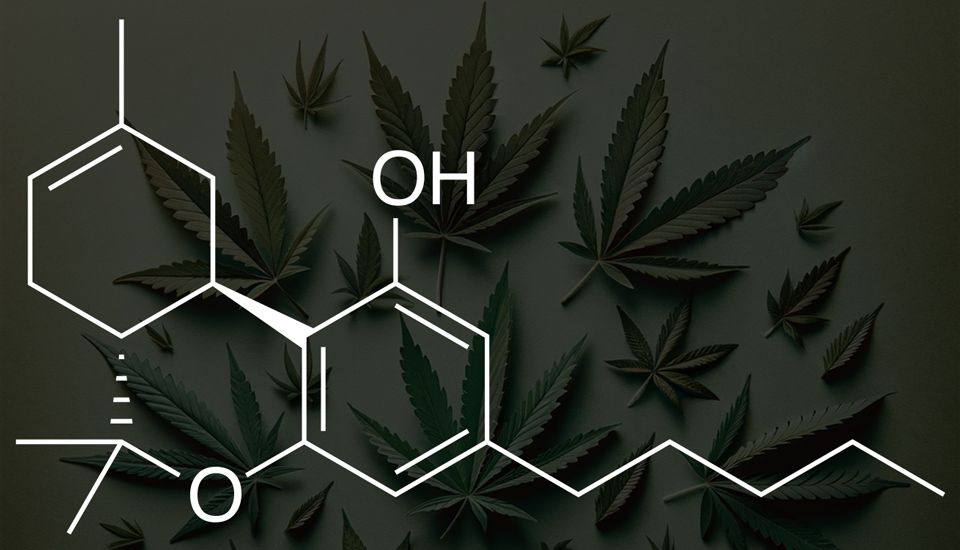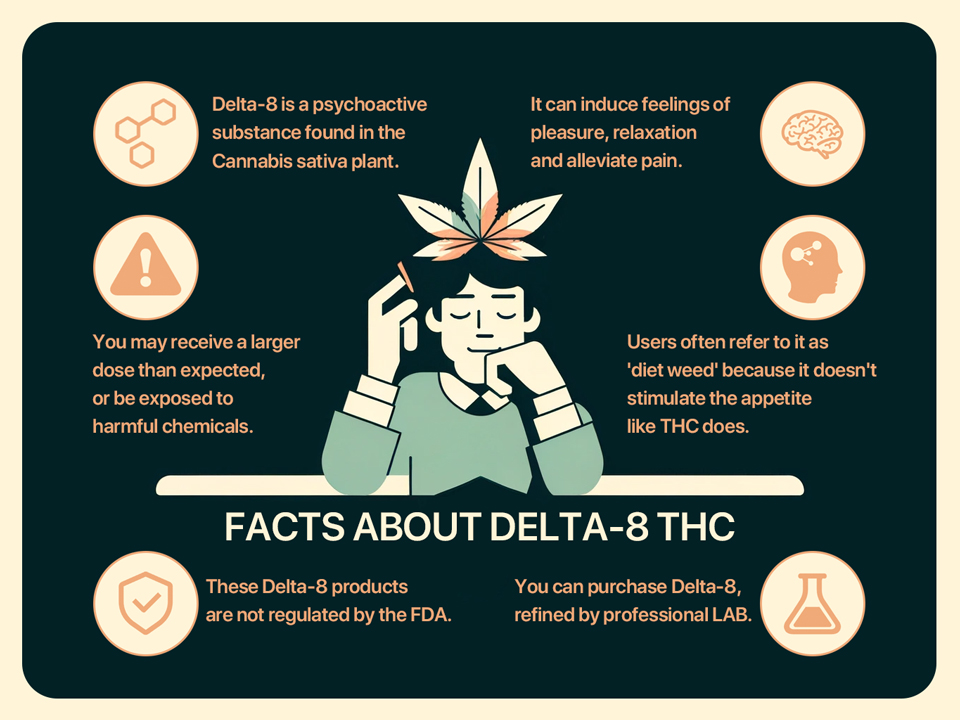Delta-8 THC (Delta 8 tetrahydrocannabinol) is a psychoactive substance called a cannabinoid that has recently garnered attention in the wellness and cannabis industries. It is an isomer of Delta-9 THC, the most well-known form of THC, which is the psychoactive compound in cannabis responsible for the ‘high’ sensation. However, Delta 8 is distinct in its chemical structure and effects.

Chemical Profile and Production
Delta-8 naturally occurs in cannabis plants in very small quantities. Due to its trace amounts, most Delta 8 on the market is synthesized from CBD (cannabidiol) derived from hemp. This process involves the use of chemicals to convert CBD into Delta-8 THC, leading to a concentrated form that is not typically found in nature.
Legal Landscape
Delta-8 THC’s legality is a complex and evolving issue. Federally, it’s in a legal gray area due to the 2018 Farm Bill which legalized hemp and its derivatives, but state laws vary significantly. As of 2023, Delta-8 is legal in many states, including Alabama and Texas, and also in the District of Columbia. However, it remains illegal in 14 states, such as Colorado and New York, with ambiguous legal status in Arizona, California, Minnesota, and Mississippi.
The diverse state regulations stem from Delta-8’s production methods, which can involve potentially harmful chemicals, and its similarity to Delta-9 THC, which is federally illegal. This has led some states to regulate or ban Delta-8 due to safety and marketing concerns. Consumers and businesses must be vigilant about their state’s laws regarding Delta-8, including any restrictions on age and purchase, to avoid legal issues as the regulatory landscape continues to shift.
For more information, check this: CDC HEALTH ALERT NETWORK (HAN)
Potential Benefits and Risks
- Therapeutic Prospects
Delta-8 THC has been anecdotally reported to offer several therapeutic benefits, potentially including mild analgesic (pain-relieving) effects, anxiolytic (anxiety-reducing) properties, and antiemetic (anti-nausea) effects. These claims suggest that Delta-8 THC could have a place in symptom management for conditions such as chronic pain, anxiety disorders, and nausea associated with chemotherapy. However, it’s important to note that clinical research on Delta-8 THC is still in its infancy, and more rigorous scientific studies are needed to confirm these potential benefits and to understand the full scope of its therapeutic applications.
- Safety and Side Effects
The risks associated with Delta-8 THC are not fully understood due to the lack of comprehensive studies. However, it is known to produce psychoactive effects that can vary in intensity among individuals. Common side effects may include dry mouth, red eyes, and short-term memory impairment, similar to those associated with Delta-9 THC. There is also the potential for more serious side effects such as anxiety, paranoia, and impaired motor skills, which could pose risks when performing tasks such as driving.
- Unregulated Market Concerns
A significant risk arises from the unregulated nature of the Delta-8 THC market. Without FDA regulation, products containing Delta-8 THC may not be subject to rigorous testing, leading to concerns about the presence of harmful contaminants, inaccurate labeling, and inconsistent potency. Consumers should exercise caution and seek products that have been independently tested by third-party laboratories for purity and concentration.
Consumer Considerations
For consumers interested in exploring Delta-8 THC, it is crucial to research the legal status in their area and to approach the market with caution. Products should be sourced from reputable providers who offer transparent lab testing results to ensure safety and quality.
The Future of Delta-8 THC
As Delta-8 THC continues to rise in popularity, it is likely that more research will emerge to clarify its effects and potential medical applications. Additionally, the evolving legal landscape will shape how Delta-8 is accessed and used by consumers.

Conclusion
The Delta-8 THC is a cannabinoid that offers a milder psychoactive experience compared to Delta-9 THC. While it may have potential benefits, the lack of regulation poses risks to consumers. As the conversation around cannabis and its derivatives evolves, Delta-8 remains a substance of interest for both its therapeutic potential and its controversial status.
FAQ Of Delta 8 THC
Is Delta 8 the Same as THC?
Delta-8-tetrahydrocannabinol (delta-8-THC, Δ8-THC) is a psychoactive cannabinoid found in the Cannabis plant and is an isomer of delta-9-tetrahydrocannabinol (delta-9-THC, Δ9-THC), the compound commonly known as THC.
Will Delta 8 Show Up in Drug Test?
Yes, Delta-8 THC can show up on a drug test. Most standard drug tests are designed to detect the metabolites of THC, and since Delta-8 THC is chemically similar to Delta-9 THC, it can result in a positive test for THC.

Leave a Reply